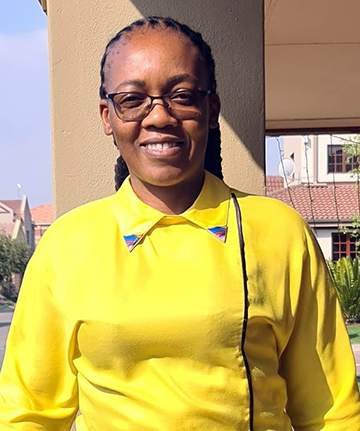News & Media
Unisa plays a lead role in the transformation agenda of the CA profession
Senior Lecturer and Chair of the Department of Financial Governance, Kebaabetswe Ramushwana's journey to becoming a Chartered Accountant (CA) started in Gopane village in Zeerust, a small town in the Northwest Province, where she was born and spent a good deal of her upbringing.

Kebaabetswe Ramushwana
An astute specialist in financial governance, Ramushwana matriculated in 1993, at Motswedi High School, with her head held high full of hope towards entering a university of her choice. But her aspirations were curtailed by financial challenges, which led her to opt to study at Sefako Makgatho Health Sciences University.
"Due to financial constraints, I enrolled at Sefako Makgatho Health Sciences University in 1995, where I qualified as a radiographer and later worked in both public and private sectors," she says. After that, Ramushwana considered the prospects of radiography and, realising that it provided few upward options, took a fascinated delight in the idea of being a CA. At that point, she enrolled at Unisa for a Bachelor of Accounting Sciences while working as a radiographer. After graduating, she joined Unisa as a student assistant in the College of Accounting Sciences while completing her Certificate in the Theory of Accountancy (CTA) exams.
Unisa is the highest contributor to the CA profession
Unisa plays a vital role in the transformation agenda of chartered accountants and the accounting profession at large. The university takes the lead in the number of black, coloured and Indian candidates who pass the Initial Test of Competence (ITC) conducted by the South African Institute of Chartered Accountants (SAICA).
"I think Unisa has contributed significantly to producing CAs; specifically, the university produces even more black chartered accountants," says Ramushwana. She continues: "I'll take myself as an example, I would not have been able to go and study at a full-time institution, but through Unisa's unique ODeL environment, I was able to work and study simultaneously."
Following SAICA's release of the ITC results for June 2022, a total number of 1 658 candidates participated. Unisa accounted for a total of 1 011 candidates. Out of the 1 658 candidates, only 412 candidates successfully passed the examination. Unisa accounted for 168 of those candidates. The university remains the country's highest and most significant contributor of chartered accountants and accounting professionals.
The need to have more CAs in Africa
Given the growing rate of citizens' dissatisfaction with governance in African countries, Ramushwana says there is a need to ensure that Africans try to improve how they deal with governance issues. She adds that a CA's role is to ensure that corporate governance is adhered to.
She explains: "We need to bring in more CAs who can influence the corporate governance space and also bring a significant element of ethical conduct and behaviour that steers entities towards their visions. With that, they can guide the ethical culture within entities and try to influence positive adherence."
She adds: "For Africa to be able to have its own experts and to develop its own solutions for its own problems so that we don't necessarily rely on the West, the first step is to train more CAs to guide entities in preventing corruption, detecting fraud and aligning proper strategies for growth."
Right career choices at an early age
Ramushwana laments the years she wished she had career guidance from an early age, which would have placed her where she wanted her career to start much sooner.
She advocates that learners from grade 9 must be guided on what subjects to choose so they can follow their dream careers. She explains: " The sooner we shape their careers, the better because, unfortunately, a lot of families in South Africa don't have learned people per se, especially when you look at the circumstances of rural areas, where many people migrate into urban areas to better their lives."
Unisa remains the institution with the most significant number of black candidates whose socioeconomic circumstances make access to contact universities an elusive option. The university also remains committed to advancing and transforming the accounting profession in South Africa.
*By Godfrey Madibade, Acting Journalist, Department of Institutional Advancement
*Additional reporting by Tshimangadzo Mphaphuli, Acting Editor, Department of Institutional Advancement
Publish date: 2022/11/30

 Unisa co-hosts G20 community outreach in the Eastern Cape
Unisa co-hosts G20 community outreach in the Eastern Cape
 Unisans gain membership of prestigious science academies
Unisans gain membership of prestigious science academies
 Advocating for disability transformation through servant leadership
Advocating for disability transformation through servant leadership
 Unisa Press continues to illuminate the publishing space
Unisa Press continues to illuminate the publishing space